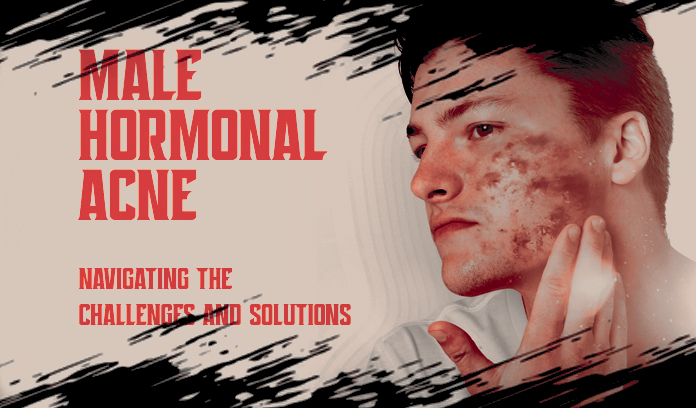Hormonal acne is a pesky skin concern faced by individuals of all genders. While often linked to adolescence, hormonal acne can persist well into adulthood, especially in males.
Let’s explore its causes, symptoms, and effective strategies for prevention.
Understanding Male Hormonal Acne
Causes and Triggers
Male hormonal acne primarily stems from fluctuations in testosterone and dihydrotestosterone (DHT) levels. These hormonal imbalances can be triggered by various factors, including genetic predispositions and environmental influences.
Hormones Involved
Testosterone, a key male sex hormone, plays a significant role in the development of acne. DHT, a derivative of testosterone, contributes to the overproduction of sebum, leading to clogged pores and acne formation.
Impact of Genetics
Genetic factors also play a crucial role in male hormonal acne. Individuals with a family history of acne may be more prone to developing hormonal acne, emphasizing the need for personalized skin care approaches.
Signs and Symptoms
Identifying Male Hormonal Acne
Distinguishing hormonal acne from regular acne involves recognizing specific patterns, such as acne concentrated around the jawline, neck, and back. Understanding these signs aids in early intervention and treatment.
Differentiating from Regular Acne
While the symptoms may overlap, male hormonal acne often presents with more persistent and inflammatory lesions. It’s essential to seek a dermatologist’s help for an accurate diagnosis and tailored treatment plan.
Lifestyle Factors
Diet And Its Connection To Hormonal Acne
Certain dietary choices can exacerbate hormonal acne. Incorporating skin-friendly foods into one’s daily routine, like antioxidants, healthy fats, and soluble fiber helps maintain overall skin health.
Additionally, adequate hydration helps eliminate toxins from our system for a much clearer-looking skin.
Stress and its Impact
Stress is a known trigger for hormonal imbalances and acne breakouts. Managing stress through relaxation techniques and mindfulness can positively impact male hormonal acne and overall skin health.
Skincare Tips for Male Hormonal Acne
Recommended skincare routine
Crafting a suitable skincare routine is essential for managing hormonal acne. It is essential to pick a gentle, non-abrasive cleanser keeping skin sensitivity in mind.
Wash your face twice a day, followed by a lightweight and non-comedogenic moisturizer for acne-prone skin. Opt for a broad spectrum and fragrance-free sunscreen before stepping outside to shield your skin from harmful rays.
A visit to your dermatologist to seek more recommended solutions tailored to male skin can be beneficial.
Treatment Options
Over-the-Counter Solutions
A variety of over-the-counter products target male hormonal acne. From salicylic acid to benzoyl peroxide, understanding the role of these ingredients is key to choosing the right products.
Prescription Medications
For severe cases, dermatologists may prescribe medications like retinoids or antibiotics. Exploring the benefits and potential side effects will encourage individuals to seek medical intervention.
Dermatological Procedures
Advanced professional treatments, including laser therapy and chemical peels, offer additional options for managing male hormonal acne.
Consult your dermatologist to know more about their effectiveness.
Prevention Strategies
Maintaining hormonal balance
Proactive measures to maintain hormonal balance are crucial for preventing acne outbreaks. Lifestyle adjustments, stress management, and regular exercise play integral roles.
Healthy Lifestyle Choices
Incorporating healthy habits, such as staying hydrated and avoiding prolonged sun exposure, contributes to overall skin health.
A balanced diet rich in nutrients and antioxidants also contributes to a clearer-looking complexion.
FAQs
-
Does hormonal acne affect males at any age, or is it primarily associated with puberty?
While hormonal acne often starts during puberty due to hormonal fluctuations, it can persist into adulthood and affect males at various stages of life.
-
How can I differentiate between regular acne and male hormonal acne?
Hormonal acne in males typically presents with deeper, more persistent lesions around the jawline and neck. Consulting a dermatologist for an accurate diagnosis is recommended.
-
Is it vital to seek professional help for male hormonal acne, or can over-the-counter products be effective?
Mild cases may respond to over-the-counter products, but consulting a dermatologist is crucial for personal advice. Severe cases may require prescription medications or dermatological procedures.
-
How long can it take to notice results from skincare regimens and treatments for male hormonal acne?
Results vary, but consistent skincare habits may show improvement in a few weeks. Prescription medications and dermatological procedures may require more time, and individual responses also vary. Patience is key in any treatment plan.
-
Are there certain foods that can worsen hormonal acne, and what dietary modifications can help improve the condition?
Certain foods, like dairy and high-glycemic-index foods, may exacerbate hormonal acne. Adopting a balanced diet rich in fruits, vegetables, and lean proteins can contribute to better skin health.
Conclusion
In conclusion, navigating male hormonal acne requires a multifaceted approach that combines understanding its causes, recognizing symptoms, and implementing effective strategies for prevention and treatment.
From lifestyle modifications and skin care habits to seeking professional guidance, individuals can take informed steps to manage hormonal acne and promote overall skin well-being.
Remember, your journey is unique, and with the right knowledge and support, achieving clearer and healthier skin is very much possible.











